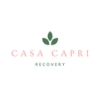Healing with strength: Why women are reframing rehab for eating disorders
Staff Writer | September 28, 2025


This article was made possible thanks to Casa Capri Recovery, a recovery centre for women.
Recovery stories often get flattened into statistics, stripped of the very human voices that make them matter. Women know better.
Behind the quiet numbers are lives shaped by long battles with food, body image, and identity – and more importantly, lives reshaped by the decision to seek help.
Talking about rehab for eating disorders isn’t about dramatising struggle; it’s about showing what possibility looks like when support is real, intentional, and designed for women who deserve better than silence.
Understanding the first step
Choosing rehab is rarely straightforward. For many women, it comes after years of telling themselves they’ll “fix it on their own”, or hiding their distress behind a facade of balance.
The first step often isn’t a dramatic moment of collapse but a quiet recognition: this isn’t sustainable. Rehab doesn’t erase the past; it offers a way to move forward with resources that extend far beyond willpower. Structured care acknowledges that disordered eating is not about vanity or discipline, it’s about complex emotional, psychological, and sometimes medical patterns that need professional support to untangle.
When women walk into these programs, they’re met with a spectrum of care. Some start with residential treatment, where day-to-day life is reshaped under medical supervision. Others may begin with partial hospitalisation or intensive outpatient programs. Regardless of the setting, the approach is personalised, aiming to meet women where they are rather than forcing a one-size-fits-all method.
The message is clear: there’s no shame in needing more than self-control. Strength often looks like asking for help.
Shifting the conversation inside work and home
One of the most overlooked barriers to care is how a woman’s world reacts when she chooses rehab. The weight of stigma can feel heavier than the condition itself.
Conversations at work, at home, and in social circles shape whether she feels supported or judged. In professional settings, workplace culture can either help normalise mental health care or make women feel like their struggles are something to hide. When companies promote policies that encourage openness – whether through flexible scheduling for appointments or genuine dialogue around mental wellbeing – they give women room to recover without fear of losing credibility.
The same is true within families and friendships. Support doesn’t have to look like perfect understanding; it can be as simple as listening without judgement or stepping back from commentary about weight, diets or appearance.
Women in rehab often notice how language and attitudes shift their recovery, and it’s a reminder that healing isn’t just internal. It’s deeply influenced by the environment that surrounds them, for better or worse.
Treatment that works with the body and mind
Rehab isn’t about teaching women how to eat a salad or how many calories to consume in a day. That’s missing the point entirely. It’s about rewiring the relationship between body, food, and self-worth.
Nutrition counselling is part of the picture, but it sits alongside therapy that digs into the roots of behaviours: cognitive behavioural therapy to address thought patterns, dialectical behavioural therapy to regulate emotions, and group work that reminds women they’re not alone in what can feel like an isolating fight.
Medical monitoring often plays a vital role, especially for women whose physical health has been strained by years of disordered eating. The focus isn’t punishment or restriction; it’s safety. Recovery requires a stable body to support the emotional and psychological work ahead.
A woman’s health team – doctors, dietitians, therapists – functions not as authority figures dictating her choices but as collaborators invested in her long-term wellbeing. This integrative approach is what makes rehab a bridge rather than a stopgap.
The power of peer connection
If you ask women what surprised them most about entering rehab, many will point to the people they met. Group therapy and community living environments reveal the quiet solidarity that can’t be found scrolling online forums or keeping secrets in the dark.
Women swap stories, frustrations, and moments of progress, building bonds that hold them accountable in ways professional guidance alone can’t. These connections often become lifelines once formal treatment ends, extending into friendships that remind women their recovery doesn’t have an expiration date.
Peer support is also what makes aftercare so important. Rehab doesn’t end the day a woman leaves the program. Transitioning back into daily life is where recovery is tested, and staying connected to others who’ve walked the same road can steady the path. This is why many programs build alumni networks or encourage participation in ongoing therapy groups.
When women see recovery modelled not just by staff but by peers further along, it becomes easier to believe their own healing is sustainable. It also makes finding eating disorder help feel less like an isolated act and more like joining a continuum of women who’ve chosen strength over silence.
Rehab as a reset, not an ending
The language of “cure” doesn’t quite fit when talking about eating disorder recovery. Rehab isn’t about reaching some perfect state of eating without ever having another difficult day. It’s about learning skills that make those difficult days manageable rather than overwhelming.
For some women, relapse happens. That doesn’t erase the progress they’ve made or negate the tools they’ve built. It simply underscores why recovery is treated as a long-term process instead of a finish line.
Rehab provides a reset point. It’s where women learn how to interrupt cycles that once felt automatic, how to question the inner critic that once went unchecked, and how to carve out a healthier relationship with themselves. When rehab is framed this way, it becomes less intimidating. It’s not a verdict, it’s an opportunity. And in that reframing, women are more likely to see it as something empowering rather than shameful.
Building a future that supports recovery
What happens after rehab often matters more than the treatment itself. Women need environments that reinforce what they learned rather than undermine it. That can mean making intentional choices about social media use, curating a more supportive circle of friends, or even re-evaluating relationships that feed into old behaviours.
For some, it means advocating for change in the broader culture – pushing back against industries that profit off insecurities, or mentoring younger women who are just beginning to navigate their own relationship with body and food.
This doesn’t mean life after rehab is defined only by recovery. Women move forward into careers, relationships, families, and passions. The difference is that rehab helps create the foundation so those parts of life aren’t built on shaky ground. Confidence, once tied to numbers on a scale or plates of food, becomes rooted in values and abilities. Women carry forward the understanding that healing is an ongoing act of self-respect.
Rehab for eating disorders isn’t just a medical intervention — it’s a collective acknowledgment that women deserve better than battling silently against relentless pressures and misconceptions. It’s a space where health takes priority, where connection rewrites isolation, and where strength is defined not by perfection but by persistence.
The story of rehab is not one of shame or defeat. It’s one of women claiming the support they’re entitled to, and walking out with tools to build a life that feels like their own again.
Sponsored

This article was made possible thanks to Casa Capri Recovery, a recovery centre for women.
We have a request
SHE DEFINED’s journalism is independent and we’re committed to elevating the voices of women by putting them front-and-centre in our stories and giving them a platform to speak up.
Quality journalism and editorial content takes time, money and resources to create, which is why your support matters. We don’t have a paywall or exclusive subscriptions because we believe in keeping our stories open to everyone.
Help support our mission by making a financial contribution today.






